
How Gaming Affects Learning in College
Every year, millions of students arrive at university with the dream of obtaining a degree and securing a future for themselves. While most students graduate and progress into successful careers, others do not, with up to 33% of undergraduate students dropping out 1 1. https://educationdata.org/college-dropout-rates/ × . So how does gaming affect learning in students?
Table of Contents
There are a variety of reasons why students fail out of college or university including homesickness, being academically unprepared, financial constraints, personal issues, lack of motivation, laziness, and no guidance or mentoring, but the modern student has another phenomenon to navigate: video games.
This article looks at how popular gaming is at on college campuses and explores the ways video games can positively and negatively affect learning and academic success. If you are a concerned parent, there are tips on how to support your college gamer and help them develop healthy gaming habits.
How popular is gaming at college?
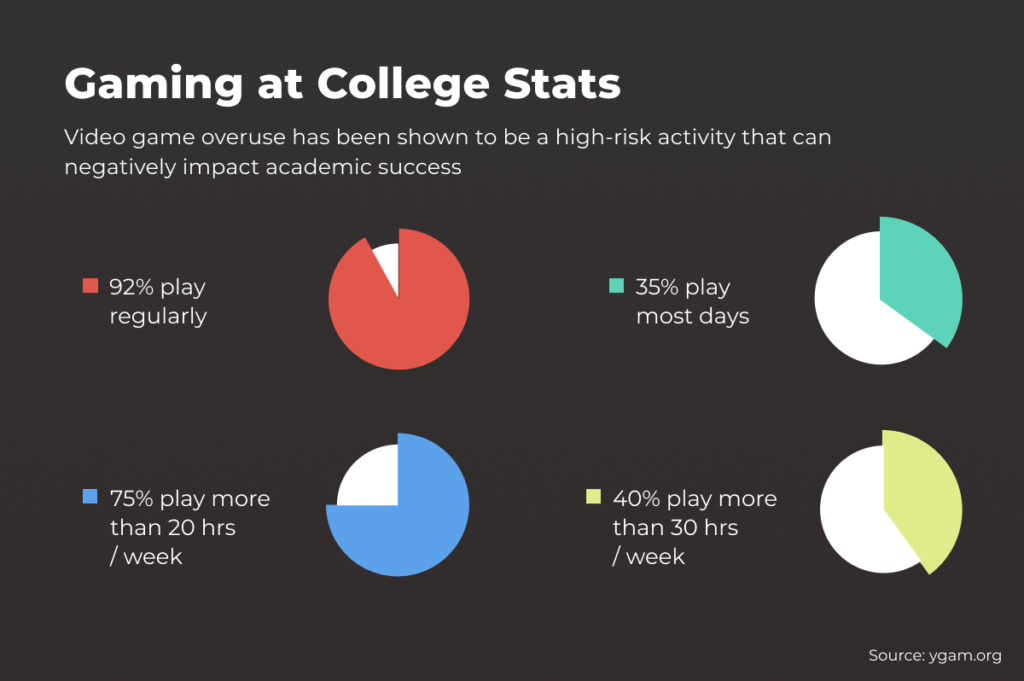
Most students today are gamers with 92% playing regularly and 35% playing most days. On average, 75% play more than 20 hours per week and over 40% report playing more than 30 hours.
An increasing number of colleges and universities are embracing video games with the rise of esports – 175 US higher education institutions offer varsity esports programs 2 2. https://www.ncsasports.org/college-esports-scholarships/varsity-esports × with full or partial scholarships and are members of the National Association of Collegiate Esports (NACE).
However, despite the multiple benefits of gaming and esports when played in moderation (see below), video game overuse has been shown to be a high-risk activity that can negatively impact academic success and 48% of student gamers agree that gaming keeps them from studying 3 3. https://www.pewresearch.org/internet/2003/07/06/let-the-games-begin-gaming-technology-and-college-students/ × .
How many college students are addicted to video games?
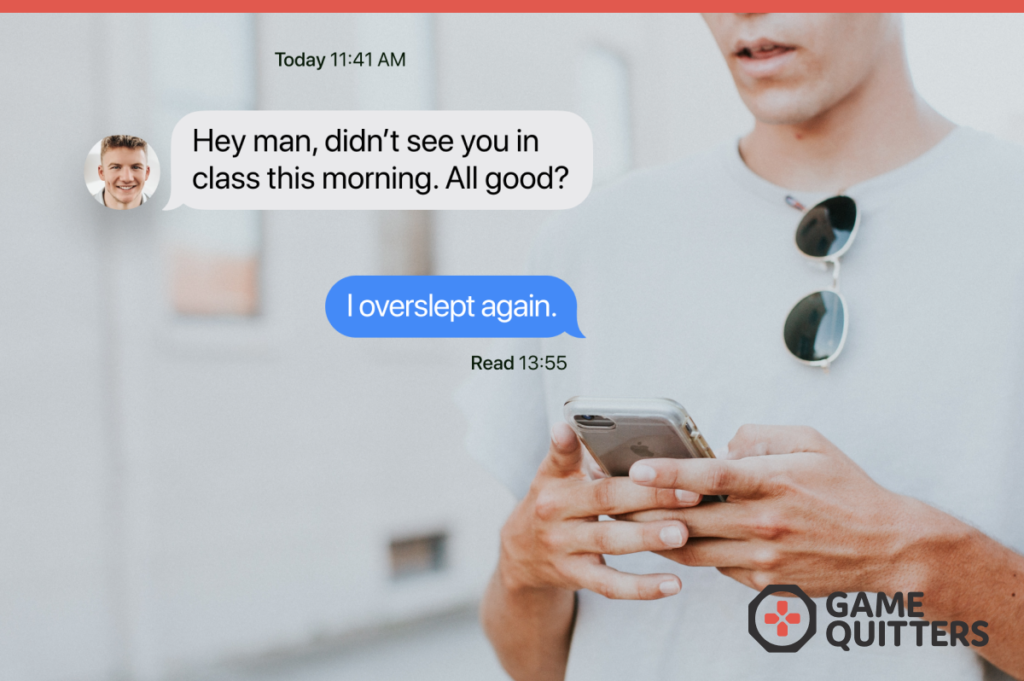
Here are some statistics about video game use and unhealthy gaming habits among young American adults:
- More males (aged 18-29) play video games than females: 77% versus 57%.
- 9% of people aged 18-24 are preoccupied with playing video games.
- Over 5% of young adults experience withdrawal symptoms when not able to game.
- More than 8% of people aged 18-24 are unsuccessful when trying to control the amount time they spend gaming.
- Over 3% of young adults have lost or jeopardized a relationship, job or educational opportunity as a direct result of their gaming activities.
Jakes’s story
As a Canadian high school student, Jake was a functional addict. His gaming was problematic and did affect his grades but he still enjoyed playing sports and had a wide circle of friends.
That was until he went off to school at the University of Guelph and away from his family in Toronto. Faced with the anxiety of a first-year college student, Jake used gaming to cope with school and personal issues.
Without his parents monitoring his play, Jake began gaming all night and missing classes. He started to lose weight and stopped showering as much. He hit rock bottom during his second year when he missed the registration cut-off date and was on the verge of being evicted from his residence hall because he was no longer technically a student. That is when he sent an email to his mother asking for help. When she arrived at his dorm, she says he was “pale, shaking and smelled foul.”
He moved back home to begin his video game recovery and, with the support of his family and a counsellor, turned his life around. Today, he hasn’t played a game for five years, instead spending his time on new activities and a job he secured with a software company. He has also graduated from college – unlike when he failed before because gaming was affecting his learning.
The gaming cycle explained
Jake isn’t alone. Over 85,000 people search for help on the Game Quitters website every month. Read other real-life stories of gaming addicts. The typical person seeking support is a male college student aged 18-24 years old who has become caught in the gaming cycle.
The gaming cycle works like this: roughly 9% of students develop problematic gaming in high school but are often able to cope with gaming and academic requirements 4 4. https://drdouglas.org/gclslfk2011ft.html × . Classwork in high school is typically easier than college work, living at home enables more parental supervision, and gamers have been proven to perform significantly better in terms of reasoning and short-term memory 5 5. https://greenlab.psych.wisc.edu/wp-content/uploads/sites/280/2017/07/Memory-abilities-in-action-video-game-playersMcDermott-Bavelier-Green-2014.pdf × which affects learning and helps them perform well academically.
The transition to college is a different story.
College students usually have less parental supervision, more independence, increased academic responsibilities, and a change in social environment which all lead to increased levels of stress. The student gamer often turns to video games as a way to escape. Instead of doing their college work, they game. They get further behind in class causing more stress and they escape further into games to cope with their anxiety. This creates a cycle of academic self-destruction.
To make matters worse, two in three students say they tend to keep issues or problems to themselves 6 6. https://www.ygam.org/wp-content/uploads/2020/07/FINAL-research_full_report-PRINT-READY-5.pdf × . The main reason for not seeking support is stigma 7 7. https://openrepository.aut.ac.nz/bitstream/handle/10292/7726/DriverJ.pdf?sequence=3&isAllowed=y × and even if a student does ask for help, they may be turned away. Many student affairs departments are overwhelmed after the rise in mental health issues experienced by young people during the Covid-19 pandemic.
How gaming affects learning and academic success
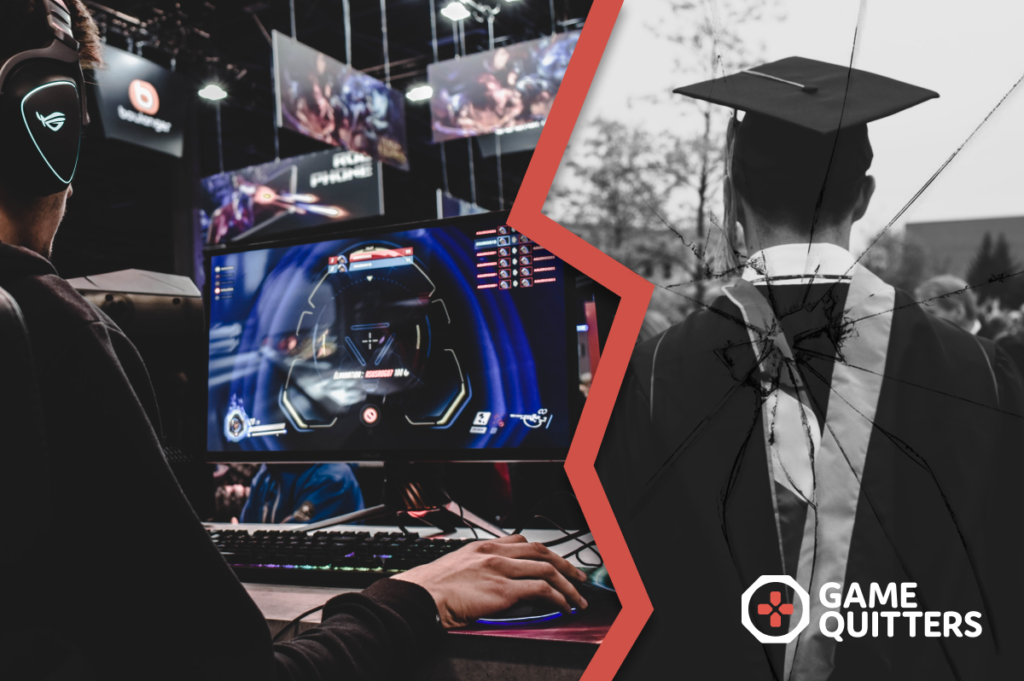
Gaming can positively and negatively impact learning and academic performance depending on the level of engagement. Too much of anything – including playing video games – can be a bad thing. Moderation and balance are key.
The benefits of gaming for academic success
Playing video games is not always harmful. It can be a fun and enjoyable activity with multiple academic benefits including:
- Increased interest in STEM subjects
- Improved problem-solving skills and logic
- Greater multi-tasking ability
- Faster and more accurate decision-making
- Enhanced creativity
- Greater brain efficiency
- Memory enhancement
- Improved cognitive abilities.
A recent study 8 8. https://www.sciencedirect.com/science/article/abs/pii/S1875952121000094 × measured the differences in academic performance between students who played video games and students who did not. It found that gaming can positively affect educational outcomes. Students who spent equal time playing video games and studying still achieved high grades. The researchers reported that many students adopted a ‘work hard, play hard’ approach and rewarded themselves with gaming time for studying.
The risks of gaming on educational outcomes
When gaming takes over a student’s life, and the line is crossed between intentional and compulsive use, it can have serious consequences:
- Lack of motivation and poor focus
- Missed learning opportunities through skipping class
- Lower grades, games affecting learning
- Extended years in college
- Mental health problems including depression, anxious and stress
- Lack of sleep
- Increased aggression
- Feelings of isolation and helplessness
- Cyberbullying and internet safety risks
- Poor personal hygiene and diet.
Find out more about the negative effects of gaming.
A US study explored video game addiction and college performance among male first-year students. It found that video game addiction was negatively correlated with expected college engagement and grade point average (GPA) 9 9. https://publish.illinois.edu/zhengqi2/files/2016/05/source2.pdf × . This suggests that as video addiction symptoms increase, student involvement in college life and academic performance decrease.
How to keep healthy gaming habits in college
When gaming is a positive habit, it can be a regular part of college life, without gaming affecting learning. Here are some strategies individuals can use to develop and maintain healthy gaming habits:
- Limit gaming to certain times and use a schedule to keep it in balance.
- Do not game in class.
- Have other interests and activities besides gaming – see our hobby tool for suggestions.
- Socialize with other students in person.
- Minimize blue light as it can interfere with sleep – use blue light minimizing glasses or blue light filter on your screens.
- Stop gaming an hour before bed.
- Get plenty of sleep. If your student accommodation has one room for sleeping and gaming, use an alarm to monitor your gaming time.
- Choose video games that are positive experiences – be mindful of toxic play and the temptation to overspend.
- Drink plenty of water, limit caffeine, eat healthily and avoid junk snacks.
- Take regular breaks to move around, preferably outside.
- Avoid hunching over the screen – try to play with a straight back with your monitor at eye level.
- Shut your eyes for a couple of minutes every hour to relax your eye muscles.
- Review how much you’re playing each week and adjust it if necessary.
How to know when gaming is an issue
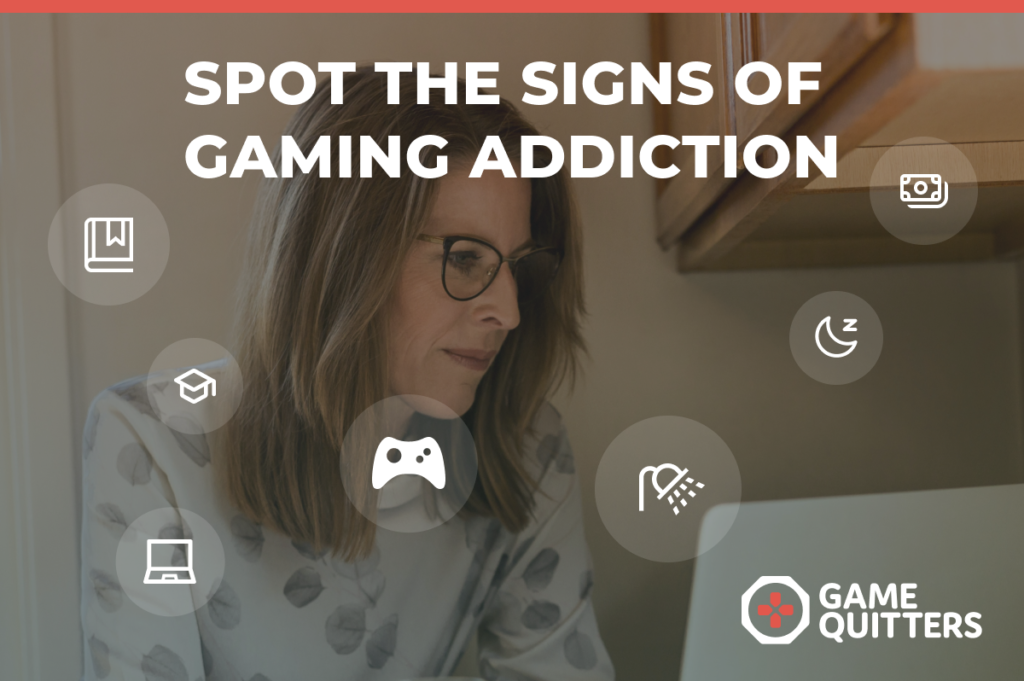
It can be tricky to differentiate healthy from unhealthy gameplay, as there is not one single factor to determine video game addiction.
Instead, there are several warning signs that, when presenting together, can signify problematic behavior.
If you are concerned about a loved one’s preoccupation with video games, the signs listed below will help you gauge if there’s a problem. Your loved one can also take our video game addiction test.
Signs of healthy video game use
- The individual is open and honest about the amount of time they spend playing video games.
- The individual has full control of their video game activities.
- The individual is able to stop or reduce the amount they play if it starts to cause problems.
- The individual does not lose sleep to continue gaming.
- The individual stops playing to eat, shower and do other daily tasks.
- The individual is able to focus on their job or education.
- The individual has time to spend with family and friends.
- The individual has other hobbies and interests.
- The individual can fully immerse themselves in a game and then easily return to the offline world.
- The individual is not overly bothered if their video game is interrupted.
- The individual will not spend money they can’t afford on video games.
Signs of unhealthy video game use
- The individual is unable to control their gaming activities despite attempts to stop or reduce play.
- The individual continues to play video games even though it has a negative effect on their life.
- The individual needs to spend an increasing amount of time playing video games to get the same level of pleasure.
- The individual is restless and irritable when unable to play.
- The individual is constantly thinking about their next gaming session.
- The individual lies about how much time they spend playing video games.
- The individual uses gaming to escape from everyday life.
- The individual is sleep deprived due to regularly playing at night.
- The individual skips meals, neglects their personal hygiene and avoids other daily tasks to continue playing video games.
- The individual prioritizes video games over other hobbies and interests.
- The individual misses educational or career opportunities.
- The individual withdraws from spending time with friends and family.
- The individual gets angry or annoyed if their video game is interrupted.
- The individual will get into debt to buy the latest video games and/or through in-game spending.
Where to find support
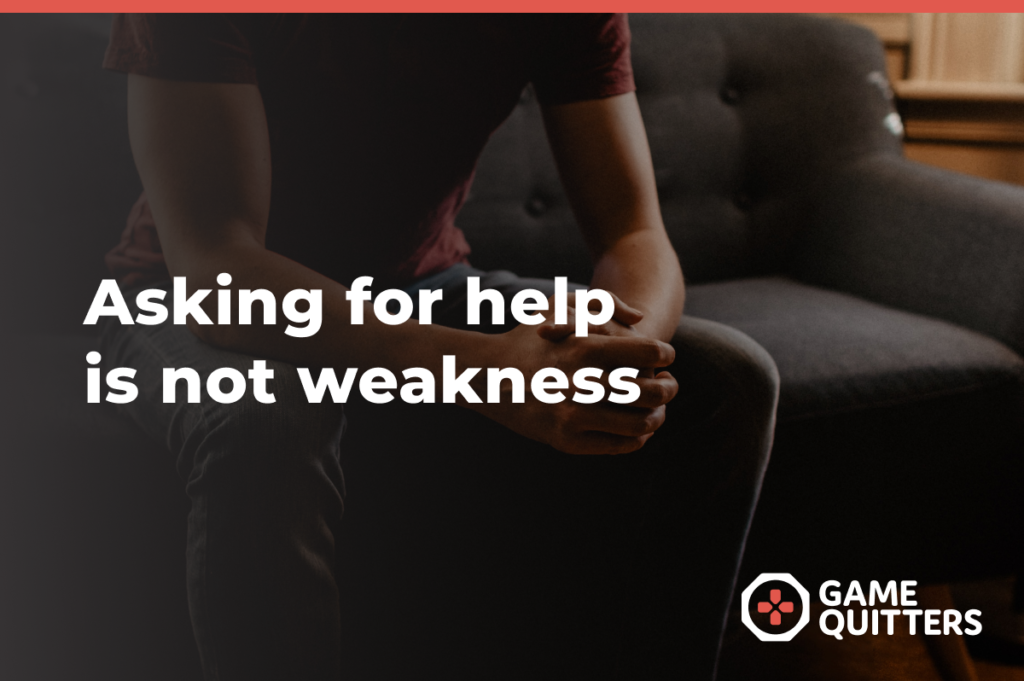
Left untreated, video game addiction and any associated mental health issues can have a lasting impact on your child’s education, career prospects, and physical and mental well-being. However, help is available to get their life back on track.
On-campus support
Most universities and colleges have free, or low cost, student counseling services that provide on-campus mental health support. You can usually find out what is available and how to access help in the counseling service section of the university or college website. When making an enquiry, it is important to check that the therapists are trained in gaming issues.
Many campuses have an on-site student health center that offers a range of front-line medical services. If any student is showing physical signs of video game addiction – such as migraines, back pain, eye strain, carpal tunnel syndrome or exhaustion – they can assess the problem and signpost to the appropriate medical and/or psychological support.
Off-campus support
If you are struggling to find specialist help for video game addiction on-campus, Game Quitters has coaching programs, resources and support groups for students and parents.
You can also read our guide: How to quit gaming in college.
Our Parent Coaching program is recommended if your loved one has lost control of their gaming habits and you need a strategy to get their life back on track. Here are some of the benefits:
- Establish a stronger relationship with your child.
- Discover how to respond to difficult situations and reduce conflict.
- Improve communication and connection at home.
- Build confidence in your parenting skills.
- Enhance your problem-solving and conflict resolution skills.
- Create a calmer and happier home environment.
- Learn self-care techniques.
- Understand the stages of video game addiction and recovery, and how to cope with relapse.
- Have a professional as part of your parenting team.
CLICK HERE TO BOOK A GAMEPLAN CALL
How to support a college gamer
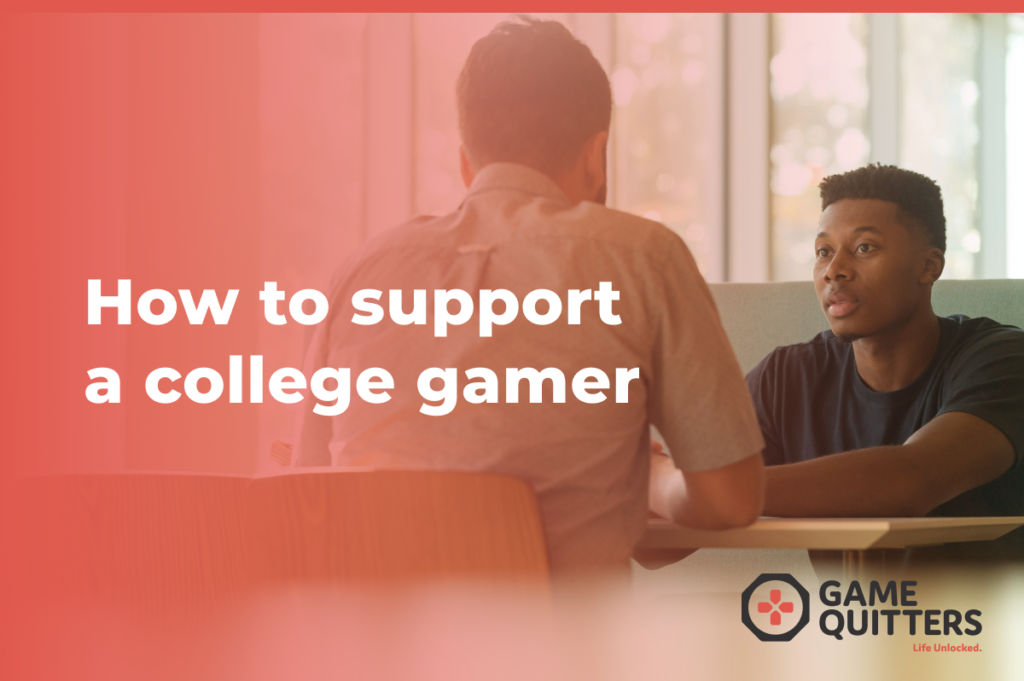
If your child is showing signs of video game addiction, you may be wondering how to help them regain control of their gaming habits. It may seem tempting to simply remove all access to gaming devices and the internet.
However, enforcing a complete detox is not practical if they are living away from home at college or sustainable as their brain will have become accustomed to the rush of dopamine induced by gaming and they will experience withdrawal symptoms as a result. While the long-term solution may be to quit gaming, the short-term goal should be to reduce the amount of time they play video games in small increments – this is known as harm reduction.
Here are some ways you can help them gradually reduce their reliance on video games:
- Educate them on what gaming does to the brain.
- Get involved in the roommate selection process and try to avoid choosing a roommate who is a gamer.
- Limit the games paraphernalia they take to college – leave video games, gaming PC, large monitor/screen at home.
- Draw up gaming/study timetable together so there is a healthy balance of both.
- Do not fund their gaming habit – refuse to pay for game subscriptions and micro-transactions and set limits on their phone data plan to stop large downloads.
- Suggest they get a part-time job to fill their free time with something other than gaming.
- Encourage them to join non-gaming clubs and societies to expand their social circle and extracurricular interests.
- Consider a gap year if classes are being failed and use that time to seek support and help them regain control of their gaming habits.
Even if your child’s situation seems hopeless now, it is possible to turn their life around. Read this inspiring story of how one student gaming addict turned his life around.
Footnotes
- https://educationdata.org/college-dropout-rates/ ↩
- https://www.ncsasports.org/college-esports-scholarships/varsity-esports ↩
- https://www.pewresearch.org/internet/2003/07/06/let-the-games-begin-gaming-technology-and-college-students/ ↩
- https://drdouglas.org/gclslfk2011ft.html ↩
- https://greenlab.psych.wisc.edu/wp-content/uploads/sites/280/2017/07/Memory-abilities-in-action-video-game-playersMcDermott-Bavelier-Green-2014.pdf ↩
- https://www.ygam.org/wp-content/uploads/2020/07/FINAL-research_full_report-PRINT-READY-5.pdf ↩
- https://openrepository.aut.ac.nz/bitstream/handle/10292/7726/DriverJ.pdf?sequence=3&isAllowed=y ↩
- https://www.sciencedirect.com/science/article/abs/pii/S1875952121000094 ↩
- https://publish.illinois.edu/zhengqi2/files/2016/05/source2.pdf ↩
